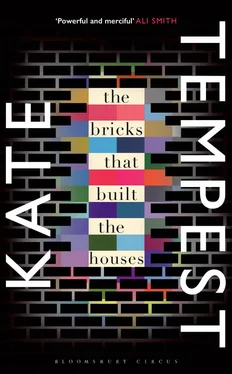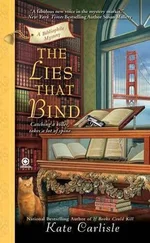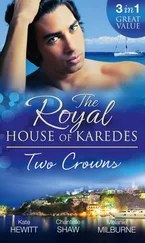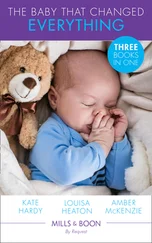Pete starts walking. The city lurches all around him. People push past and swear at him and he feels lost amongst it all. Flashes of their bodies riddle him with secret glee, but he can feel the fear coming. He wards it off but feels it pushing. He never knows when it will trip him up.
He decides to knock on at Nathan and Mo’s. They’re two of his oldest friends and he hasn’t seen them in months. They live about fifteen minutes’ walk away, up towards Honor Oak Park. He turns off the main road and heads up the wide, tree-lined street with the big old houses bruised from the years, glancing up at the ornate roofs and big proud windows. He walks past the church and takes a left and strolls back out into the dirt and grit of squat brick buildings, broken window frames, road-blackened house fronts. Snarling children. Smiling dogs. He goes slowly past the chip shop, the newsagent’s, the off-licence, some girls on their bikes shouting at each other, the chicken shop, the barber’s, three men in prayer robes leaning against the bicycle racks outside the Co-op, the jerk shop, the Good News Bakery, the funeral parlour, the block of flats, a man moving a fridge on two skateboards, the garage with the arsehole woman who works at the counter, the carwash, the kebab shop, the houses with their whitewashed walls and gravel drives, the pub, the other pub. The nice Caribbean restaurant. Pete ducks through the iron gate and cuts across the cemetery, overgrown and rich with green. Trees everywhere. He stares up into them; they sway in sunlight, the crumbling stones, the angels and monuments, the crunch of the path under his quick feet. The smell in the air of spring.
Nathan is big-boned, heavy-set. Bearded. He’s a bass player and a beat maker and he speaks like a subwoofer. Mo is gangly to the point of precarious, walks in long strides, his face is all smile. He works in an energy company call centre. They’re on the sofa watching catch-up TV. They’re halfway through a dating show. Pete sits down between them, stretches his legs out and starts skinning up.
‘What you been up to?’ Mo asks him, glancing at him, eyes red.
‘Not much,’ Pete says. Mo nods.
‘Cool,’ Nathan says, and they settle back in to the telly.
Pete stares at the colours on the widescreen plasma box in front of him. He watches the pixels unravel and merge. Everything starts going fast and he can feel a dread lurking in the corner of the room, a shadow with its mouth open, head back, unleashing maniacal laughter. He blinks. Looks back at the telly. But the world has speeded up and now everything he focuses on slows right down. He watches his hands, they are far away. He can feel things happening that he can’t see. His skin starts prickling, the sweat is preparing itself behind his pores. His vision is fast, jagged, violent. Breathe . But his breath is pixelated, too fast. Calm . Hard heartbeat. Chest pains. Calm down . Eyes on the TV, then down to the Rizla.
‘That guy’s a dick,’ Nathan says. ‘Where do they find these people?’
‘It’s telly, innit,’ Mo says. ‘It invents these people.’
They all watch silently, faces screwed up in disdain.
‘You should go on this, Mo. You’d fuckin’ nail it,’ Nathan tells him.
Pete smiles widely at the thought. Blinks a few times. Feels like his face is coming back to him.
‘Think so?’ Mo glances across him, at Nathan.
‘Yeah, they’d love you,’ Nathan says. ‘Imagine it. You’d fucking boss it.’
The three of them look at the screen. A man wearing a waistcoat open over an oiled chest and baggy chinos slides down a pole into a TV studio where thirty women behind podiums indicate whether or not they’d go out on a date with him by turning on or off their lights. Pete looks at his hands, keeps breathing. Sitting between them, reminding himself where he is, who they are, he’d like to say something to them but the silence in his mouth is a massive apple that he can’t speak around, shoved right into his throat. He’s sure there’s something terrible coming for them all. The dread swells from a point in his middle. Everything that could go wrong goes wrong on repeat in lurid detail. Her body keeps coming back to him. The way she turned him round and climbed across him. How she grabbed his throat like that. He sniffs, wipes his nose on his sleeve.
Pete was twelve when he got into smoking skunk. He started hanging out with the kids from round his neighbourhood who took him out painting with them.
His new mates were passionate conspiracy theorists. They would get high and talk for hours about the secret organisations that controlled the world. It all made perfect sense to Pete. There were reasons and proof, there were ancient prophecies and irrefutable evidence, and a story about the end coming. It would begin with the making of a one-world nation. United under one currency. There would be one global police force. One global justice system. One army under the beast. Once this had come to pass, we would be in the last days, and the last days would drag on until only two good people remained on Earth — the last two who refused the mark of the beast; a computer chip that the one-world government would put inside our hands. These chips, the story went, would be justified in the name of public security and convenience. A cashless economy. One chip and no more banknotes. You couldn’t be robbed. It would be your ID, your credit card. It would be your new smartphone. Your travel card. What did you have to hide? It would be your passport. Without one you wouldn’t be able to move between borders, buy food or pay your water bill. You wouldn’t be able to survive. They’d do it slowly, so we thought it was our choice. We wouldn’t see that it was forced on us, we’d see it as convenient, it would be the new must-have accessory. The solution to our fabricated fears. Why wouldn’t you want one?
As he grew up Pete watched the growing prevalence of mobile computer chips with a bellowing, racking dread. He also watched the developments of the so-called war on terror with a choked heart; he saw it as the start of the obliteration of all nations who stood against Western global dominance.
The stories went that once these computer chips were being implanted, the one world would be divided into those who took the chip and those who wouldn’t. No more racism, class war, gender inequality. Only those with the chip, and those without. All those who wouldn’t take it would be deemed terrorists, enemies of progress, subjected to torture and constant surveillance, and eventually they would die. Living in bands in the wilderness, hunted by soldiers with heat-seeking bullets. And when there were only two left, the last two in the world who had refused the chip, all the souls who’d ever died would come back to Earth to fight each other, good against evil. Marked against unmarked.
Pete sat with his mates in their dark bedrooms with the posters on the wall of metal bands and hardcore rappers, in dingy flats in Catford, and he stroked their dogs while they nodded and whispered and played documentaries in the daytime with the curtains closed. And he was convinced it was true. He was sure he would be one of the last two.
As he got older, he shook himself out of it, but it never left him. Not really. He went to uni and he couldn’t help it, everything he learned he learned through the filter of those heavy, scary, endless stories. It was like a secret faith he couldn’t mention. He’d be reading his textbooks, or sitting in lectures, and the more he learned of the way the world worked, the more convinced he was.
He avoided getting an Oyster card for as long as he could because he didn’t like the way it was made compulsory. It didn’t matter that he didn’t want his movements tracked. He couldn’t get a bus until he did it their way. In the end though, he gave in, and every time he used it to travel or to cut a line up, he felt the tug of shame.
Читать дальше












